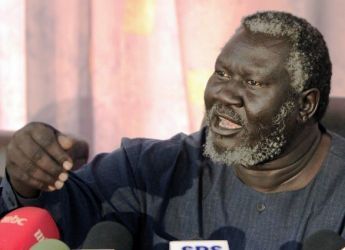SPLM-N calls for implementation of African roadmap for peace in Sudan
February 2, 2015 (KHARTOUM) – The Sudan People’s Liberation Movement-North (SPLM-N) has called on the African Union (AU) to implement a roadmap for peace and constitutional reforms as endorsed by the AU Peace and Security Council (AUPSC) last September.

The meeting was part of consultations the African mediation conducts before to resume discussions between the warring parties in Blue Nile and South Kordofan on a framework agreement for a cessation of hostilities and ways to achieve a comprehensive peace and democratic reforms in Sudan.
In a statement extended to Sudan Tribune Monday, SPLM-N spokesperson Mubarak Ardol said the meeting discussed the outcome of Mbeki’s recent visit to Khartoum and opportunities for peace in Sudan.
Ardol said the rebel delegation stressed its commitment to a comprehensive peace in Sudan as a strategic choice, emphasising that “The only way to reach peace is the implementation of the African Union’s decision (456), to stop the war and allow freedoms”.
On 15 September 2014, the AUPSC adopted a roadmap providing to hold a two-track peace process aiming to reach a cessation of hostilities in the Two Areas and Darfur.
The Council also decided that a preparatory and inclusive meeting would be held at the AU headquarters to discuss national dialogue modalities under the patronage of Mbeki’s panel.
The AUPSC further urged Khartoum to create a conducive environment for the internal political process through the release of political detainees, and taking necessary measures to ensure political freedoms and full guarantee of the freedom of expression and publication.
According to Ardol, the rebel delegation told the meeting that Khartoum did not positively interact with the AUHIP efforts, pointing that “the regime is unable to provide any serious response leading to a comprehensive peace, to end war and grant freedoms.”
The SPLM-N leadership further pointed to “the dwindling chances for peace [in Sudan], as a result of widespread human rights violations, war crimes, constitutional amendments, Khartoum refusal to postpone elections, broad attack on the freedoms and the press and the arrests of the ‘Call of Sudan’ leaders”.
SPLM-N secretary-general Yasir Arman last week criticised a constitutional amendment passed by the legislators, cancelling the election of states governors by popular vote. As of now they will be appointed by the president.
“The constitutional amendments have dashed definitively all what was provided in the (interim) constitution and previous peace agreement of 2005,” Arman said last Friday.
He underscored the draft framework agreement proposed by the AUHIP is partly based on the comprehensive peace agreement.
The Sudanese government announced last week its readiness to resume talks with the SPLM-N.
Following a meeting with the Sudanese president, Mbeki told reporters that Bashir is ready to accept the participation of rebels in the national dialogue if the talks on a cessation of hostilities achieve some progress.
“He has reassured us that if we can continue with the negotiations on the cessation of hostilities, the armed groups can participate in the national dialogue,” Mbeki said.
(ST)
